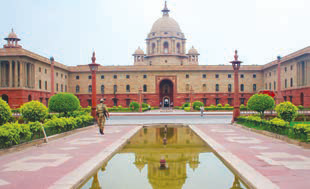NEW DELHI (TIP): As President Pranab Mukherjee’s term ends on July 24, the Election Commission today announced that voting for choosing India‘s next president will be held on July 17 while counting will be on July 20 if needed.
Although none of the political parties have come up with names of their candidates yet speculations are on the rife. Some Opposition leaders have been trying to come up with the name of a consensus candidate. The ruling BJP-led NDA is likely to announce their nominee in the next fewdays.
WHO CAN VOTE
Only members of the electoral college are eligible to vote in the presidential election. The electoral college comprises elected members of both Houses of Parliament and elected members of the legislative Assemblies of all states including Delhi and the union territory of Puducherry. A total of 4896 voters including 4120 MLAs and 776 elected MPs are eligible to cast their ballot.
WHO CANNOT VOTE
All nominated members of Rajya Sabha, Lok Sabha and legislative Assemblies do not have the right to vote. Members of the Legislative Councils also do not have voting rights.
HOW THE VOTING WILL HAPPEN
Unlike Lok Sabha and Assembly elections in India, the presidential elections do not have electronic voting system using EVMs. The Election Commission will supply a special pen to all voters to mark their choice of candidate on ballot papers.
A principle of proportional representation is followed under which the elector has to mark preferences against the names of the candidates. The elector can mark as many preference as the number of candidates.
While the marking of the first preference is compulsory for the ballot paper to be valid, other preferences are optional.
WHERE WILL VOTING BE HELD
Polling for the election will take place in the Parliament House and in the premises of the legislative Assemblies.
SECRET BALLOT
The Constitution has expressly provided that election to the office of President shall be by secret ballot. Voting procedure laid down in the 1974 Rules provides that after marking the vote in the voting compartment, the elector is required to fold the ballot paper and insert it in the ballot box.
NO WHIP
Political parties cannot issue any whip to their MPs and MLAs in the matter of voting in the Presidential election.
NOMINATION OF CANDIDATES
The nomination paper of a candidate has to be subscribed by at least 50 electors as proposers and by at least another 50 electors as seconders. A security deposit of Rs 15,000 is also needed.
ELECTION SCHEDULEJune 14: Issue of notificationJune 28: Last date to make nominationJune 29: Date for scrutiny of nominationJuly 1: Last day to withdraw nominationJuly 17: Date of Election (if needed)July 20: Counting of votes will be held in Delhi (if needed) |
Presidents of India? Rajendra Prasad: 1950 to 1962 ? Sarvepalli Radhakrishnan: 1962 to 1967 ? Zakir Hussain:1967 to 1969 ? VV Giri (Acting President): 1969 to 1969 ? Mohammad Hidayatullah (Acting President): 1969 to 1969 ? V.V Giri: 1969 to 1974 ? Fakhruddin Ali Ahmed: 1974 to 1977 ? Basappa Danappa Jatti (Acting President): 1977 to 1977 ? Neelam Sanjiva Reddy: 1977 to 1982 ? Giani Zail Singh: 1982 to 1987 ? R Venkataraman: 1987 to 1992 ? Shankar Dayal Sharma: 1992 to 1997 ? K R Narayanan: 1997 to 2002 ? APJ Abdul Kalam: 2002 to 2007 ? Pratibha Patil: 2007 to 2012 ? Pranab Mukherjee: 2012 to present |
